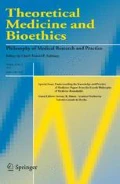Abstract
Most of the attention regarding the balance between autonomy and paternalism has been focused on the therapeutic relation. Much less attention has been devoted to the problem of autonomy in the application of medical knowledge for preventive purposes. Here, because the good to be achieved is social as well as individual, an unavoidable dilemma ensues. Effective preventive measures of benefit to all must necessarily limit autonomy and involve some coercion. I argue that there are principles which can be established to guide society in a moral use of coercion. The question of employing medical knowledge is not, as it is in therapeutic medicine, to preserve or enhance autonomy. Rather its aim is to enhance voluntary co-operation. Principles for moral use of coercion must thereby be derived from health as a moral value.
Similar content being viewed by others
Author information
Authors and Affiliations
Additional information
This paper is an abridged version of a presentation at the Frank M. Norfleet Forum, University of Tennessee Center for the Health Sciences, Memphis, Tennessee, given on November 29, 1982. The expanded version is available from the University of Tennessee.
Rights and permissions
About this article
Cite this article
Pellegrino, E.D. Autonomy and coercion in disease prevention and health promotion. Theor Med Bioeth 5, 83–91 (1984). https://doi.org/10.1007/BF00489248
Issue Date:
DOI: https://doi.org/10.1007/BF00489248




